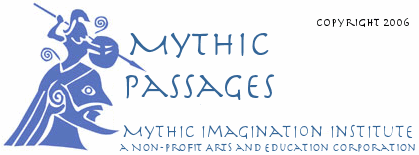|

Notes from the Editor
by Mary Davis
"There are 96 words for love in Sanskrit, 80 in Persian, 3 in Greek and 1 in English," says Robert Johnson, noted Jungian analyst,
"So when I say 'I love you' in English, which dozen things am I saying?"
This conversation about love is included in the recently released three hour DVD, Slender Threads, A Conversation With Robert A.
Johnson. The interviews were conducted by J. Pittman McGehee (presenter at Mythic Journeys 04) at Robert Johnson's request in
July, 2002, following his retirement from public life. They cover his work, his path, his life, the numinous, East and West, and more in a
beautiful discussion. He talks about being "in love" as "the divine madness"...that we in the West do not have the vocabulary for the
needed differentiation, that we get our levels crossed. Read more about Robert Johnson and "love" in
Michael Karlin's essay, and also
about love in our own culture's sacred stories.
So you, the reader, may have guessed that our main theme this month is "love." Volumes have been written. Love is a topic
that is at the core of what it means to be human. I have been re-reading volumes of poetry from William Blake to Shakespeare to
Rilke to Pablo Neruda to Mary Oliver to many collections of poets. On poet, Coleman Barks
(a presenter at Mythic Journeys '04 and '06), is known as the person who brings the heartful and the erotic aspects of Rumi's poetry
into English. "What is the heart? It is not human, and it is not imaginary. I call it you." This is a brief sample translation of Rumi
by Coleman which speaks to the deep friendship between Jelaluddin Rumi and Shams of Tabriz.
An even more ancient poet, Hesiod, believed that eros, love as the abstract principle of desire, was born out of the void, out of
chaos at the very beginning of creation and that this desire, this eros was the key ingredient necessary for the universe to function.
Scholar Robert Graves says that the Orphics believed that Eros set the universe in motion. Ancient roots of the modern saying, "Love
makes the world go round!"
For this issue I have chosen poems of three new poets, Mythic Journeys guest speaker
Taije Silverman,
her friend Jason Schossler,
and Cecilia Woloch who speak
to various kinds of love from maternal love to erotic love and loss. And within the article by
James Flannery ( Yeats' scholar and presenter
at Mythic Journeys '04 and '06), you will read some of William Butler Yeats' poetry, including "The Song of the Wandering Aengus"
(Aengus, the Celtic god of love) and a poem by Seamus Heaney, who believed the pathway to enlightenment is found by yielding to love.
Within Mythic Journeys 04 and 06 presenter Sheri Kling's article, you will
read and hear the poetry of her songs!
So you may ask, what is the connection of love to myth? Joseph Campbell reminded us, "Myths come from where the heart is, and
where the experience is..." You'll read more of the connections in Honora Foah's essay in
which she takes us from Gabriel Garcia Marquez to the big story of Aphrodite, Eros, Psyche, Ares and Hephaestus.
David Abram (Mythic Journeys 06 presenter) in "Storytelling and Wonder"
weaves together myth, story, imagination, love, and the incredibly beautiful, sensuous, living world of nature in which we find ourselves.
Here's one more gift for you, an ancient Sanskrit chant taught by my teacher, T.K.V. Desikachar, which for me, states the case for love,
for heart:
Hrdayam mayi
Aham amrte
Amrtam brahmani
Let my life force be linked to my heart
Let my heart be linked to the truth within me
Let this truth be linked to the eternal.
Next month our March issue of Mythic Passages will include an article about love in action, amar la tierr, love the earth
which features Mythic Journeys presenter Andres Botran and the Mayan Chorti weavers as they create change for the
people of Guatamala. You will learn about a special surprise which the Mayan weavers and Andres will bring for you when you attend
Mythic Journeys '06!
Return to Passages Menu
Subscribe to the Passages e-newsletter
|

